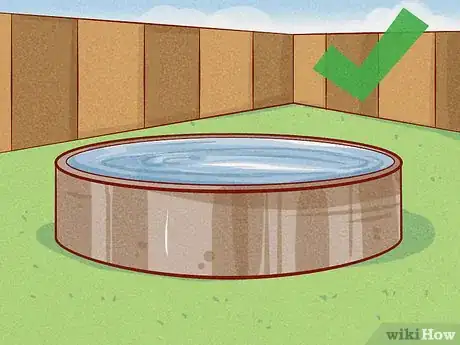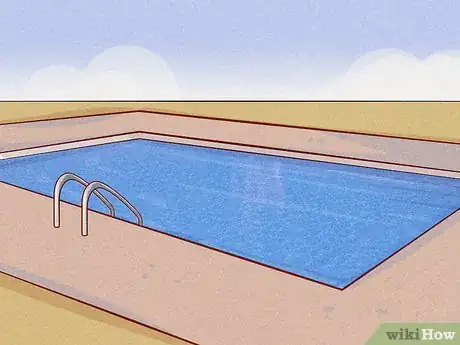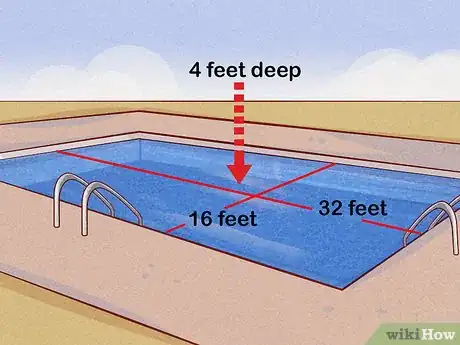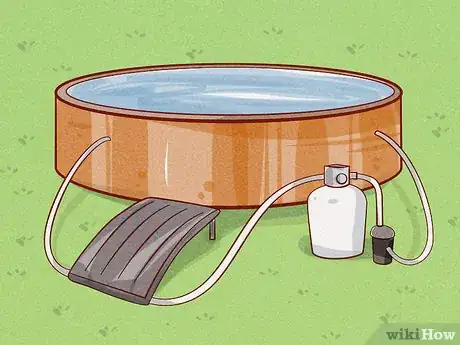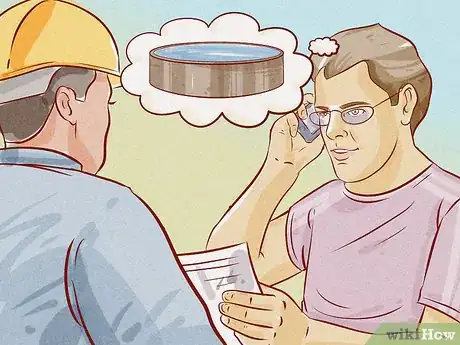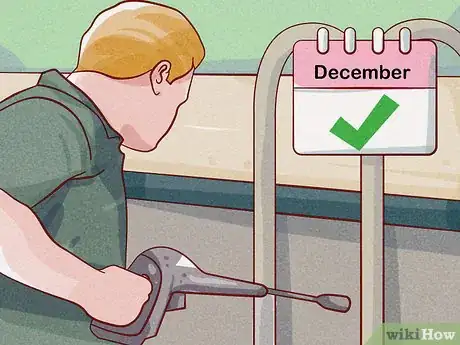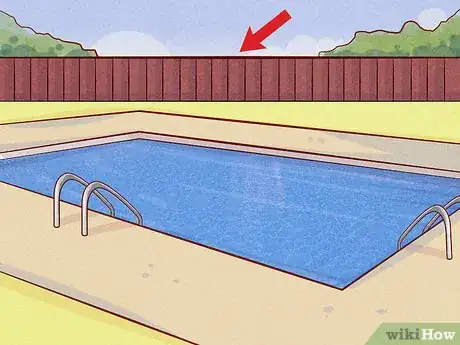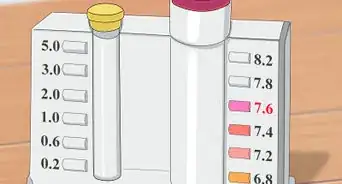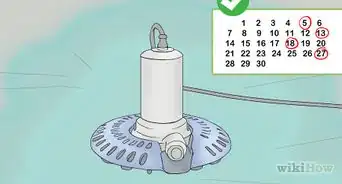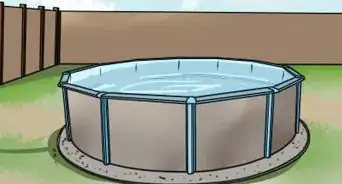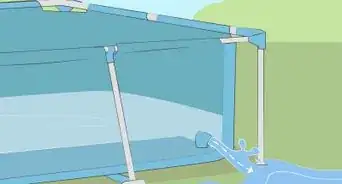This article was co-authored by Rob Litman. Rob Litman is a Landscaper, General Contractor, and the CEO of Vitoli Inc., a landscaping, hardscaping, ecoscaping, and swimming pool design company in Los Angeles, California. With over 20 years of experience in construction, Rob specializes in energy-efficient and drought-tolerant landscaping. He holds General Building Contractor (Class B) and Registered Pool/Spa Contractor Licenses. In 2007, Rob won House of the Year in Gardena, California.
This article has been viewed 29,202 times.
Buying a swimming pool is something most people don’t do every day and so it can seem overwhelming at first. When buying something as large as a swimming pool, there are many things you'll need to take into consideration - including cost, space requirements and permits - before you can start swimming! However, by starting with research about pool costs and types and by hiring the right person to install it, you too can buy a swimming pool for your home.
Steps
Choosing the Right Pool for You
-
1Calculate the lifetime cost of a pool to determine your long-term budget. Whatever pool you buy, it will actually cost you a lot more over time than just the sticker price. Add how much you will have to pay for pool maintenance and property taxes each year to your pool’s installation price to determine the actual long-term cost of the pool you buy.[1]
- The cost of maintenance varies between different types of pools; more elaborate pools often require more expensive maintenance.
- You may also see your property taxes go up after buying a pool, depending on your local municipality’s tax policy.
- On the plus side, if your local housing market is on the upswing, then adding a pool to your property may ultimately increase its resale value.[2]
-
2Opt for an above-ground pool if you’re on a tight budget. The most important consideration that will ultimately determine what kind of pool you buy is how much money you’re able to spend on it. Consider going with an above-ground pool if you want to save money buying a pool.[3]
- Of the two most popular types of pool (above-ground and in-ground), above-ground pools tend to be significantly cheaper.
Advertisement -
3Select an in-ground pool if cost is no concern. If you want to add a long-term value investment to your house and you’re not concerned about price, an in-ground pool may be the right choice for you.[4]
- In-ground pools vary in price based on what materials they’re made out of. Pools made from vinyl liner are slightly less expensive than fiberglass pools, while concrete pools are by far the most expensive.
-
4Go with a long, deep in-ground pool if you plan to swim laps. If you want to use a pool to exercise by swimming laps, you’ll want to make sure it’s long enough and deep enough to accommodate you.[5]
- For lap swimming, your pool should be at least 4 feet (1.2 m) deep, 32 feet (9.8 m) long, and 16 feet (4.9 m) wide.
-
5Choose a spacious in-ground pool for more recreational uses. Children and teenagers tend to use pools more often than any other age group. If you have children and want to give them a place to splash around or cool off in the summer, an in-ground pool with space to swim around in may be best.[6]
- If you have 1 or 2 small children, perhaps a small above-ground pool would be better. These pools are significantly less dangerous than spacious in-ground pools.
-
6Opt for a heated pool if you live in a colder climate. In-ground pools can be installed with heaters that allow you to swim during the colder months and not be frozen out of your pool for part of the year.[7]
- Note that adding this feature to your pool will most likely increase both the installation cost and the costs of maintenance.
- Most heated pools are in-ground pools.
Shopping for a Pool
-
1Check with city hall to see what permits may be required. Depending on where you live, you may face several bureaucratic obstacles that could slow, or even stop, your pool-buying process. Go to city hall and ask if building a pool on your property requires a special permit and obtain one if necessary.[8]
- You’ll most likely need to talk to someone in the department of your city government that works on city planning and community development. If you’re unsure of who to talk to, ask at the information desk who you should speak to concerning building permits.
- Applying for a permit varies between municipalities; depending on where you live, you may need to present your construction plans to a city official, allow an inspector to inspect your property, or simply fill out an application.
- Your pool contractor will need to get permits before they can start excavating and building the pool.[9]
-
2Contact pool contractors to get estimates on installation costs. The specific cost and time needed to construct your pool will ultimately depend on the design of your pool as well as the conditions of your property. Speak to at least 3 different contractors and get estimates on what installing your pool will cost.[10]
- You can typically find pool contractors in your area with a simple Internet search. You can also probably find contractors through any brick-and-mortar store that sells pools.
- Directly but politely ask contractors you speak to what their installation practices are and what the price of installing your pool will be.
- If possible, ask if you can read over a sample contract before hiring each contractor.
-
3Ask contractors for references and talk to them about their prior work. Before you choose which contractor to hire, ask them for references from other people they’ve installed pools for and talk to those references about the work the contractor did. Ask these references whether they had any problems with their pool during or after installation.[11]
- For example, you may find by talking to a contractor’s previous clients that the contractor was often late and completed the pool installation over budget. Conversely, you may also discover that a particular contractor consistently leaves their customers very satisfied with their work.
- If possible, visit and look over pools that the contractor has previously installed to see the quality of their work first-hand.
-
4Hire a contractor with good references and experience. You should ultimately choose a contractor who has a lot of experience and has good reviews from past clients. Make sure they’re in your budget, but don’t focus on attributes that aren’t important to your project.[12]
- For example, the size of a pool installation company or whether they subcontract any of their work aren’t overly important in determining the quality of their installation work.
- Be sure to draw up a contract that spells out the exact cost and timeline of your pool installation job when you hire a contractor.
Having Your Pool Installed
-
1Have the pool installed in winter if you want to save money. Pool installation prices are often higher during spring and summer and lower during the winter. Wait to have your pool installed in December or January for the best deal.[13]
- If the pool is mainly going to be used by children, having it installed in December may also be a good way of making the pool a Christmas present.
-
2Choose to install the pool right before summer if you want to use it quickly. If you install your pool in October, you may have to wait 6 months before you’re able to actually use it. Have the pool installed in April or May if you want to have it ready to use by summer.[14]
-
3Install proper fencing, if required. Depending on your city or state, you may be required to install fencing or other safety measures in or around your pool. Check the regulations in your local area and make sure to install any signs, fences, or fixtures you’re required to have for your pool.[15]
- For example, you may be required to build a fence immediately surrounding your pool, or to simply make sure that your backyard is itself fenced in.
- Be sure to also contact your local homeowners’ association and find out if they have any particular guidelines for building and using private pools.
Expert Q&A
-
QuestionCan I customize my pool floor?
 Rob LitmanRob Litman is a Landscaper, General Contractor, and the CEO of Vitoli Inc., a landscaping, hardscaping, ecoscaping, and swimming pool design company in Los Angeles, California. With over 20 years of experience in construction, Rob specializes in energy-efficient and drought-tolerant landscaping. He holds General Building Contractor (Class B) and Registered Pool/Spa Contractor Licenses. In 2007, Rob won House of the Year in Gardena, California.
Rob LitmanRob Litman is a Landscaper, General Contractor, and the CEO of Vitoli Inc., a landscaping, hardscaping, ecoscaping, and swimming pool design company in Los Angeles, California. With over 20 years of experience in construction, Rob specializes in energy-efficient and drought-tolerant landscaping. He holds General Building Contractor (Class B) and Registered Pool/Spa Contractor Licenses. In 2007, Rob won House of the Year in Gardena, California.
Licensed Landscaper & General Contractor Yes! There are 3 different plaster variations you can choose from. The first is a basic rubber plaster that looks white in color. The second is a pebble mix, where pebbles are added on top of the rubber. This option offers a nicer finish, but isn't recommended for swimmers or families with young children, as it's a bit rough on the skin. The third option is a hybrid made with quartz, which is non-abrasive to the skin and just as durable as regular plaster.
Yes! There are 3 different plaster variations you can choose from. The first is a basic rubber plaster that looks white in color. The second is a pebble mix, where pebbles are added on top of the rubber. This option offers a nicer finish, but isn't recommended for swimmers or families with young children, as it's a bit rough on the skin. The third option is a hybrid made with quartz, which is non-abrasive to the skin and just as durable as regular plaster.
References
- ↑ https://www.moneycrashers.com/swimming-pool-costs-types/
- ↑ https://www.supermoney.com/2017/06/purchasing-a-swimming-pool/
- ↑ https://www.homestolove.co.nz/outdoor/9-things-to-consider-before-building-a-swimming-pool
- ↑ https://www.homestolove.co.nz/outdoor/9-things-to-consider-before-building-a-swimming-pool
- ↑ https://www.moneycrashers.com/swimming-pool-costs-types/
- ↑ https://www.moneycrashers.com/swimming-pool-costs-types/
- ↑ https://www.bhg.com/home-improvement/outdoor/pools-spas/planning-for-a-pool/
- ↑ https://www.supermoney.com/2017/06/purchasing-a-swimming-pool/
- ↑ Rob Litman. Licensed Landscaper & General Contractor. Expert Interview. 13 October 2020.
- ↑ https://www.supermoney.com/2017/06/purchasing-a-swimming-pool/
- ↑ https://www.bhg.com/home-improvement/outdoor/pools-spas/planning-for-a-pool/
- ↑ https://www.bhg.com/home-improvement/outdoor/pools-spas/planning-for-a-pool/
- ↑ https://www.bhg.com/home-improvement/outdoor/pools-spas/planning-for-a-pool/
- ↑ https://www.bhg.com/home-improvement/outdoor/pools-spas/planning-for-a-pool/
- ↑ https://www.moneycrashers.com/swimming-pool-costs-types/

